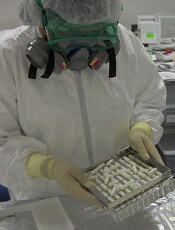
Credit: Esther Dyson
Medication mistakes, reporting errors, and record changes are what led the US Food and Drug Administration (FDA) to delay approval of the anticoagulant apixaban (Eliquis), according to a report in Pharmaceutical Approvals Monthly.
The report reveals that a number of patients enrolled on the ARISTOTLE trial received the wrong medication or the wrong dose, some serious adverse events went unreported, and employees who worked at trial sites in China altered records to cover up noncompliance with “good clinical practice.”
Apixaban won FDA approval last December as prophylaxis for stroke and systemic embolism in patients with nonvalvular atrial fibrillation. And that approval was based on results of the ARISTOTLE trial.
Prior to the approval, the FDA twice rejected a new drug application filed by apixaban’s developers, Pfizer and Bristol-Myers Squibb. But the agency’s reasons were not immediately made public.
Now, the Pharmaceutical Approvals Monthly report and FDA documents show that “data irregularities” were behind the decision.
In January 2012, Bristol-Myers Squibb notified the FDA of the cover-up attempt that occurred at (at least) 1 trial site in China. The company had learned that its senior manager at a site in Shanghai and an employee from a contract research organization had altered source records to conceal good clinical practice violations. (The employees were subsequently fired.)
According to FDA documents, the cover-up included failure to report 4 potential adverse events, late reports on 3 other events, and the omission of 3 patient outcomes. In addition, there were errors in patient names and dates, some Chinese and English records didn’t match up, and some patient records disappeared before a site visit by FDA inspectors.
Only 35 patients enrolled in the ARISTOTLE trial were treated at the Shanghai site, but the employees who perpetrated the fraud had also worked at 24 of the 36 trial sites in China.
So the FDA performed analyses excluding data from the Shanghai site alone, from the 24 sites where the employees worked, and from all 36 sites in China. And they found that apixaban’s efficacy still held up.
However, there was still the issue of ARISTOTLE participants receiving the wrong medication or the wrong dose. According to Bristol-Myers Squibb, the trial’s double-blind design allowed for dispensing errors.
Initially, the company said this meant that 7.3% of patients who were set to receive apixaban and 1.2% of patients who were set to receive warfarin may have received the wrong drug or dose at some point during the study. However, after additional review, the company said those percentages were likely much lower.
Regardless of the actual percentages, the FDA said this information suggests a pattern of inadequate oversight. And an independent review by FDA medical team leader Thomas Marciniak appears to support that statement. In addition to the aforementioned errors, his review revealed records of doctor visits taking place after patients’ deaths.
In spite of the errors and the fraud, the FDA said it remained convinced of apixaban’s efficacy. So the agency decided to approve the drug and leave out any mention of the data irregularities on the drug’s label.


